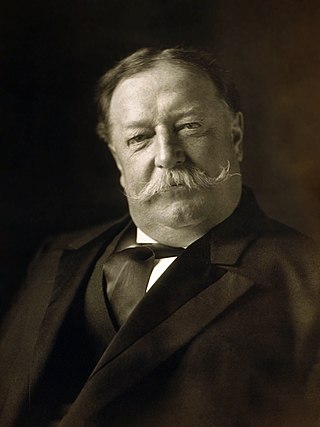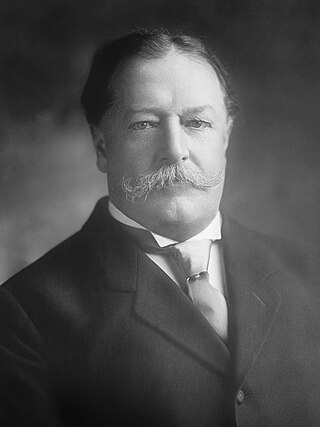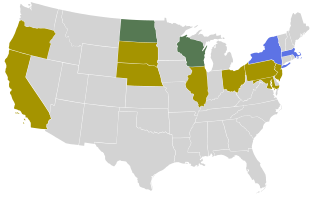
Theodore Roosevelt Jr., often referred to as Teddy or by his initials, T. R., was an American politician, statesman, soldier, conservationist, naturalist, historian, and writer who served as the 26th president of the United States from 1901 to 1909. He previously served as the 25th vice president under President William McKinley from March to September 1901 and as the 33rd governor of New York from 1899 to 1900. Assuming the presidency after McKinley's assassination, Roosevelt emerged as a leader of the Republican Party and became a driving force for anti-trust and Progressive policies.

William Howard Taft was the 27th president of the United States (1909–1913) and the tenth chief justice of the United States (1921–1930), the only person to have held both offices. Taft was elected president in 1908, the chosen successor of Theodore Roosevelt, but was defeated for reelection in 1912 by Woodrow Wilson after Roosevelt split the Republican vote by running as a third-party candidate. In 1921, President Warren G. Harding appointed Taft to be chief justice, a position he held until a month before his death.

The 1912 United States presidential election was the 32nd quadrennial presidential election, held on Tuesday, November 5, 1912. Democratic Governor Woodrow Wilson of New Jersey unseated incumbent Republican President William Howard Taft while defeating former President Theodore Roosevelt and Socialist Party nominee Eugene V. Debs.

Helen Louise Taft, known as Nellie, was the First Lady of the United States from 1909 to 1913 as the wife of President William Howard Taft. Born to a politically well-connected Ohio family, she took an early interest in political life, deciding at the age of 17 that she wished to become first lady. Herron married Taft in 1886, and she guided him throughout his political career, encouraging him to take actions that would bring him closer to the presidency. Accompanying her husband to the Philippines in 1900, she became a prominent socialite in Manila, contributing to US-Philippines relations. After her husband was appointed Secretary of War, she played a significant role in convincing him to run for president in the 1908 presidential election and making the necessary connections to ensure his success.

Archibald Willingham DeGraffenreid Clarendon Butt was an American Army officer and aide to presidents Theodore Roosevelt and William Howard Taft. After a few years as a newspaper reporter, he served two years as the First Secretary of the American embassy in Mexico. He was commissioned in the United States Volunteers in 1898 and served in the Quartermaster Corps during the Spanish–American War. After brief postings in Washington, D.C., and Cuba, he was appointed military aide to Republican presidents Roosevelt and Taft. He was a highly influential advisor on a wide range of topics to both men, and his writings are a major source of historical information on the presidencies. He died in the sinking of the British liner Titanic in 1912.

On February 17, 1974, United States Army Private Robert Kenneth Preston (1953–2009) took off in a stolen Bell UH-1B Iroquois "Huey" helicopter from Tipton Field, Maryland, and landed it on the South Lawn of the White House in a significant breach of security. Preston had enlisted in the Army to become a helicopter pilot. However, he did not graduate from the helicopter training course and lost his opportunity to attain the rank of warrant officer pilot. His enlistment bound him to serve four years in the Army, and he was sent to Fort Meade as a helicopter mechanic. Preston believed this situation was unfair and later said he stole the helicopter to show his skill as a pilot.

The 1985 White House intrusion occurred on 20 January 1985 when Robert Allen Latta, a 45-year-old water meter reader, successfully entered the White House uninvited.

The 1912 Republican National Convention was held at the Chicago Coliseum, Chicago, Illinois, from June 18 to June 22, 1912. The party nominated President William H. Taft and Vice President James S. Sherman for re-election for the 1912 United States presidential election.

The presidency of William Howard Taft began on March 4, 1909, when William Howard Taft was inaugurated as 27th president of the United States, and ended on March 4, 1913. Taft, was a Republican from Ohio. The protégé and chosen successor of President Theodore Roosevelt, he took office after easily defeating Democrat William Jennings Bryan in the 1908 presidential election. His presidency ended with his defeat in the 1912 election by Democrat Woodrow Wilson.

From January 23 to June 4, 1912, delegates to the 1912 Republican National Convention were selected through a series of primaries, caucuses, and conventions to determine the party's nominee for President in the 1912 election. Incumbent President William Howard Taft was chosen over former President Theodore Roosevelt. Taft's victory at the national convention precipitated a fissure in the Republican Party, with Roosevelt standing for the presidency as the candidate of an independent Progressive Party, and the election of Democrat Woodrow Wilson over the divided Republicans.

Eugene Charles Allen was an American waiter and butler who worked for the US government at the White House for 34 years until he retired as the head butler in 1986.

I'm Down is a memoir by the American author Mishna Wolff, originally published by St. Martin's Press in 2009. In the book, she relates her experience of being white while growing up in a predominantly African-American neighborhood and having a different financial situation and culture than the other white children at her gifted student public school program filled with mostly white kids.

The Butt–Millet Memorial Fountain is a memorial fountain in President's Park in Washington, D.C., in the United States. Dedicated in October 1913, it commemorates the deaths of Archibald Butt and Francis Davis Millet. Both men died during the sinking of the RMS Titanic on April 15, 1912.

The Butler is a 2013 American historical drama film directed and co-produced by Lee Daniels and with a screenplay by Danny Strong. It is inspired by Wil Haygood's Washington Post article "A Butler Well Served by This Election".
Wil Haygood is an American journalist and author who is known for his 2008 article "A Butler Well Served by this Election" in The Washington Post about Eugene Allen, which served as the basis for the 2013 movie The Butler. Since then, Haygood has written a book about Allen, The Butler: A Witness to History. While being interviewed on the radio program Conversations with Allan Wolper on WBGO 88.3FM, Haygood revealed that he had tracked down another White House butler. At the last minute, this butler, who had served three presidents, refused to be interviewed; the man's family apparently did not want his story out against the parallel story of the election of President Barack Obama.

The 2014 White House intrusion occurred on September 19, 2014, when Omar J. Gonzalez, an Iraq War veteran with post-traumatic stress disorder, jumped over the White House's fence and entered the building's front door, overpowered a security officer, was stopped by another who was off-duty, then later by multiple security officers, and arrested. He was found to have a small knife in his pocket, and stated that the "atmosphere was collapsing" and he needed to tell the president so that he could alert the public. President Barack Obama and his family were not home at the time of the incident. As a result of this incident and other security breaches at the White House, the then-director of the United States Secret Service, Julia Pierson, resigned from her position on October 1, 2014.
The presidency of William Howard Taft began on March 4, 1909, when William Howard Taft was inaugurated the 27th president of the United States and ended on March 4, 1913.















